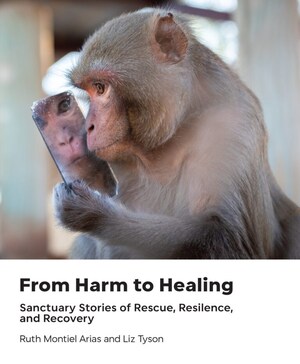Born Free USA Rescues Third "Pet" Monkey in Three Months, Calls for Ban on Pet Primates
COTULLA, Texas, Sept. 13, 2021 /PRNewswire/ -- Leading animal welfare nonprofit, Born Free USA, welcomed a new monkey to its primate sanctuary in South Texas last week. Five-year-old vervet monkey, Maliki, was surrendered after he bit his former owner. He is the third pet monkey the nonprofit has rescued in as many months. The need for homes, said the charity, far outweighs the capacity of U.S. sanctuaries, and a change in the law is necessary to curb the trade in pet primates once and for all.
Born Free USA's primate sanctuary is one of the largest in the United States, home to hundreds of monkeys, many of whom were rescued from zoos, rehomed from laboratories or, like Maliki, are rescued from the pet trade.
Now at the sanctuary, Maliki will receive high quality medical care, nutritious food, room to roam and explore in a natural setting, freedom from unnecessary interactions with humans, and, crucially, the chance to socialize with other monkeys. Says Dr. Liz Tyson, Born Free USA Programs Director and head of the primate sanctuary, "Maliki is one of the lucky ones. While he is one of the smaller species of primates commonly kept as pets in the U.S., when he bit his former owner, she realized just how dangerous these animals are and she made the right decision: to surrender him into the expert care of a sanctuary. Many others are not so lucky and an attack by a 'pet' monkey can lead to significant injury to people and, more often than not, the subsequent death of the monkey."
Conservative estimates suggest there are approximately 15,000 primates kept as "pets" in U.S. homes. Nonhuman primates (such as chimpanzees, gorillas, lemurs, orangutans, capuchins, and marmosets) are highly intelligent and sensitive wild animals. In nature, most species live in complex, multigenerational, social hierarchies. These needs are fundamentally incompatible with the realities of life in captivity as pets.
Nonhuman primates carry a host of illnesses that could pass to humans, including yellow fever, monkey pox, Ebola and Marburg virus, Herpes simiae (herpes B), simian immunodeficiency virus (SIV, the primate form of HIV), viral hepatitis, and measles. News reports in the last few months have confirmed that a lab worker in China died from Herpes B infection passed to him by a monkey. Herpes B is fatal in up to 80% of untreated cases in human beings.
Says Angela Grimes, Born Free USA CEO, "Maliki's arrival at the sanctuary is part of a larger trend we are seeing of pet primate owners wishing to rehome animals to sanctuaries. In the last three months alone, we welcomed Kiki, another vervet monkey, and Gambit, a rhesus macaque, who had both been kept as pets since they were babies. During the same period, we have been contacted with requests to take on 18 individual monkeys. The demand for homes simply outweighs the available spaces at legitimate sanctuaries. We need a legislative solution to stop the trade at the source."
While sanctuaries like Born Free USA's can provide the space and opportunity for some pet monkeys to have a fresh start in a natural setting, sanctuaries are not the solution to the exotic pet problem. Instead, a comprehensive legislative solution is needed to protect nonhuman primates and the public from the cruel and dangerous pet trade. The Captive Primate Safety Act is an important bill that would do just that. Reintroduced in both chambers of the U.S. Congress in May 2021, the Captive Primate Safety Act would prohibit the interstate commerce of primates as pets and ban the private ownership of these species, with exemptions for bona fide sanctuaries, universities, and other facilities. The bill would also restrict contact between the public and primates.
Tyson adds, "We are grateful that Maliki's former 'owner' chose to surrender him. He will now receive the expert care he requires. But, there are thousands of monkeys and other nonhuman primates being kept as pets in the U.S. – the solution to the cruel and dangerous keeping of primates as pets is not sanctuaries, but legislative change to shut down the issue at the source. The Captive Primate Safety Act will see to it that no more monkeys like Maliki suffer in the pet trade in the future, and no more people are needlessly injured by primates kept in private hands. We are working hard to ensure that this important piece of legislation becomes law."
To learn more about Maliki and the other monkeys rehomed to the sanctuary this summer, please visit www.bornfreeusa.org/findingsanctuary.
To learn more about the Born Free USA Primate Sanctuary, please visit www.bornfreeusa.org/primate-sanctuary.
To take action on the Captive Primate Safety Act, please visit www.bornfreeusa.org/cpsa.
About Born Free USA
Born Free USA works to ensure that all wild animals, whether living in captivity or in the wild, are treated with compassion and respect and are able to live their lives according to their needs. We oppose the exploitation of wild animals in captivity and campaign to keep them where they belong—in the wild. Born Free USA's Primate Sanctuary is the largest in the United States and provides a permanent home for primates rehomed from laboratories or rescued from zoos and private ownership. We're social:
www.bornfreeusa.org, www.twitter.com/bornfreeusa, www.facebook.com/bornfreeusa, www.instagram.com/bornfreeusaorg.
MEDIA CONTACT:
Heather Ripley
Orange Orchard
(865) 977-1973
[email protected]
SOURCE Born Free USA

Related Links
WANT YOUR COMPANY'S NEWS FEATURED ON PRNEWSWIRE.COM?
Newsrooms &
Influencers
Digital Media
Outlets
Journalists
Opted In






Share this article